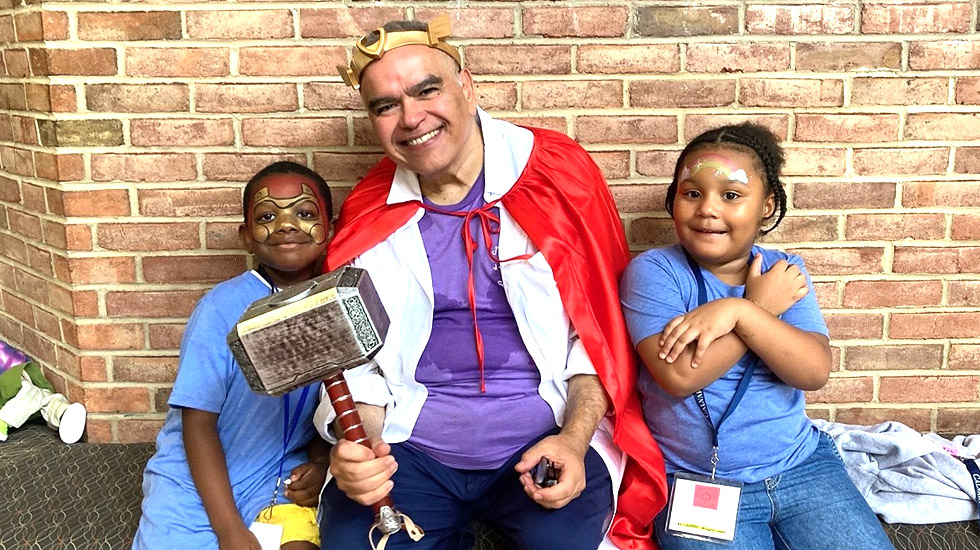Superheroes Heal This Week at Calvary’s Camp Compass®
Children and teens bond and support each other at Calvary Hospital’s annual grief camp
Superhero stories and characters will bring their exuberance and passion this week to Calvary Hospital’s CampCompass®, the only camp of its kind in New York for children and teens who have experienced the death of significant others due to illness, accidents, and violence.
Established 27 years ago by Calvary, the leader in palliative and hospice care, CampCompass® welcomes children aged 6 to 18 every summer to share their stories, explore grief, honor loss, and celebrate life. This year’s camp is located at CUNY’s Queensborough Community College, in Bayside, Queens.
“Calvary’s Camp Compass® is part of our ongoing healing programs that engage children, harness the power of ritual, and provide opportunities so they can bond and support each other,” said Edgardo Lugo, Director of Bereavement at Calvary Hospital.
“This week we’re dressing up as and featuring some of our children’s favorite superheroes. These fantastical characters are a powerful way for children to help with grief and loss, especially when it comes to issues such as adversity, resilience, and growth,” said Lugo – otherwise known this week as Thor – a registered Play Therapist Supervisor and Certified Group Psychotherapist.
“Grief is universal but experienced differently by everyone. CampCompass® honors both the child who is grieving and the person they’ve lost.”
The five-day camp, which hosts 50 children from throughout the city, starts today.

Calvary Hospital Bereavement Service caters to children of all ages as well as adults who have experienced the death of a parent, partner, child, or sibling. Calvary also provides support to schools and organizations when there is a death in their community. In addition, Calvary delivers professional grief and bereavement training to nurses, social workers, and mental health counselors throughout the city through its acclaimed Annual Bereavement Course.
Notes about Superheroes and healing
Superhero stories and characters can be powerful tools to help children cope with grief and loss in several ways:
- Relatable experiences: Many superheroes have origin stories rooted in loss and trauma, making their experiences relatable to grieving children. These characters often face the death of parents or loved ones, providing a point of connection for children dealing with similar losses.
- Modeling coping strategies: Superheroes demonstrate resilience and the ability to overcome adversity, which can inspire children to face their own challenges. By observing how these characters handle grief and loss, children can learn coping strategies and gain hope for their own healing journey.
- Emotional expression: Superhero narratives can provide a safe space for children to explore and express complex emotions associated with grief. By discussing characters’ feelings and reactions, children may find it easier to articulate their own emotions.
- Post-traumatic growth: Many superhero stories showcase characters who not only endure difficulties but grow and become better people as a result. This depiction of post-traumatic growth can inspire children to find meaning and purpose in their own experiences of loss.
- Metaphorical processing: The fantastical elements of superhero stories can offer children a metaphorical way to process their grief, making it less overwhelming and more manageable.
- Opening conversations: Using superhero stories as a starting point can help adults initiate difficult conversations about grief and loss with children in a less threatening manner.
- Normalizing grief: By showcasing characters who experience loss and grief, these stories can help normalize these experiences for children, showing them that they are not alone in their feelings.
Anti-heroes and villains can also play a role in helping children process grief:
- Exploring complex emotions: Anti-heroes often embody conflicting emotions and motivations, which can help children understand that grief is not a simple or linear process.
- Addressing anger: Villains may represent the anger and darker emotions associated with grief, allowing children to explore these feelings in a safe, fictional context.
- Understanding consequences: The actions of anti-heroes and villains can illustrate the potential consequences of unhealthy coping mechanisms, teaching children about healthier ways to deal with their emotions.
By using superhero narratives and characters as tools, adults can help children navigate the complex emotions and challenges associated with grief and loss, providing them with relatable examples and inspiring stories of resilience and growth.
Categories
Archives
- April 2025
- March 2025
- February 2025
- October 2024
- August 2024
- July 2024
- May 2024
- April 2024
- March 2024
- February 2024
- December 2023
- November 2023
- October 2023
- August 2023
- July 2023
- June 2023
- May 2023
- April 2023
- March 2023
- January 2023
- December 2022
- October 2022
- August 2022
- July 2022
- June 2022
- April 2022
- March 2022
- February 2022
- January 2022
- October 2021
- September 2021
- August 2021
- July 2021
- June 2021
- May 2021
- April 2021
- March 2021
- February 2021
- December 2020
- November 2020
- October 2020
- September 2020
- August 2020
- July 2020
- May 2020
- April 2020
- March 2020
- February 2020
- January 2020
- December 2019
- November 2019
- October 2019
- September 2019
- August 2019
- July 2019
- May 2019
- April 2019
- March 2019
- February 2019
- January 2019
- December 2018
- November 2018
- October 2018
- September 2018
- August 2018
- July 2018
- June 2018
- May 2018
- April 2018
- December 2017
- November 2017
- October 2017
- September 2017
- August 2017
- July 2017
- June 2017
- May 2017
- April 2017
- April 2012

